Psychology in Health and Social Care: Theories, Factors, and Roles
VerifiedAdded on 2019/12/03
|12
|4018
|218
Report
AI Summary
This report delves into the application of psychology within health and social care, exploring the impact of psychological factors on human behavior. It begins by comparing different theories of lifespan development, such as stage theories and open-ended theories, and relates them to various life stages, including infancy, childhood, adolescence, and adulthood. The report then examines social and biological factors, like family, culture, genetics, and social exclusion, influencing behavior, using a case study of a patient with Alzheimer's. Furthermore, the importance of social roles, such as managers, care workers, and family members, in healthcare settings is analyzed. The report also addresses the application of psychological theories to understand mental disorders and promote behavior change, and it concludes by highlighting the role of psychological theories in understanding relationships. The report provides a comprehensive overview of the key psychological concepts and their practical applications in the context of health and social care, including discussions on psycho-dynamic, behavioral, cognitive, and humanistic perspectives.
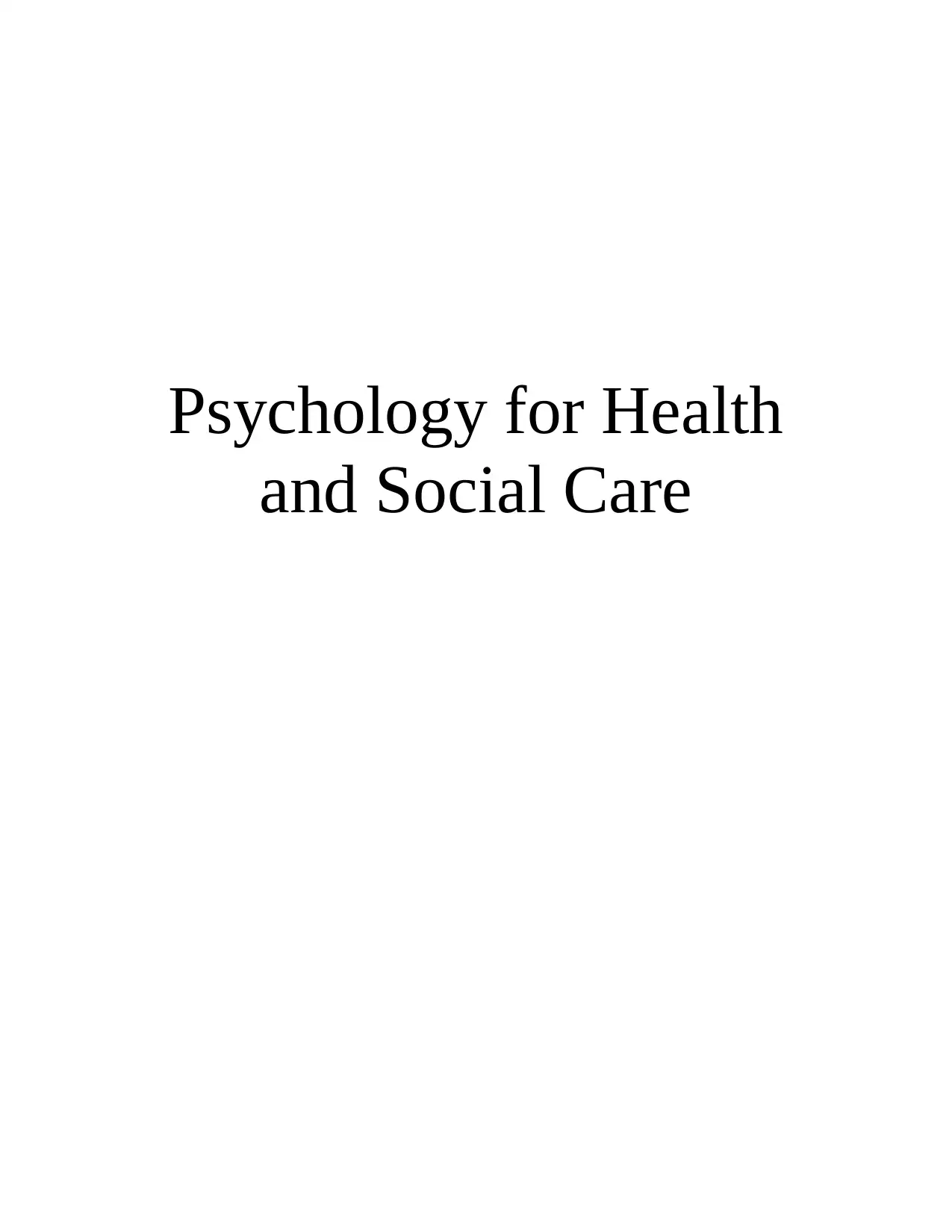
Psychology for Health
and Social Care
and Social Care
Paraphrase This Document
Need a fresh take? Get an instant paraphrase of this document with our AI Paraphraser
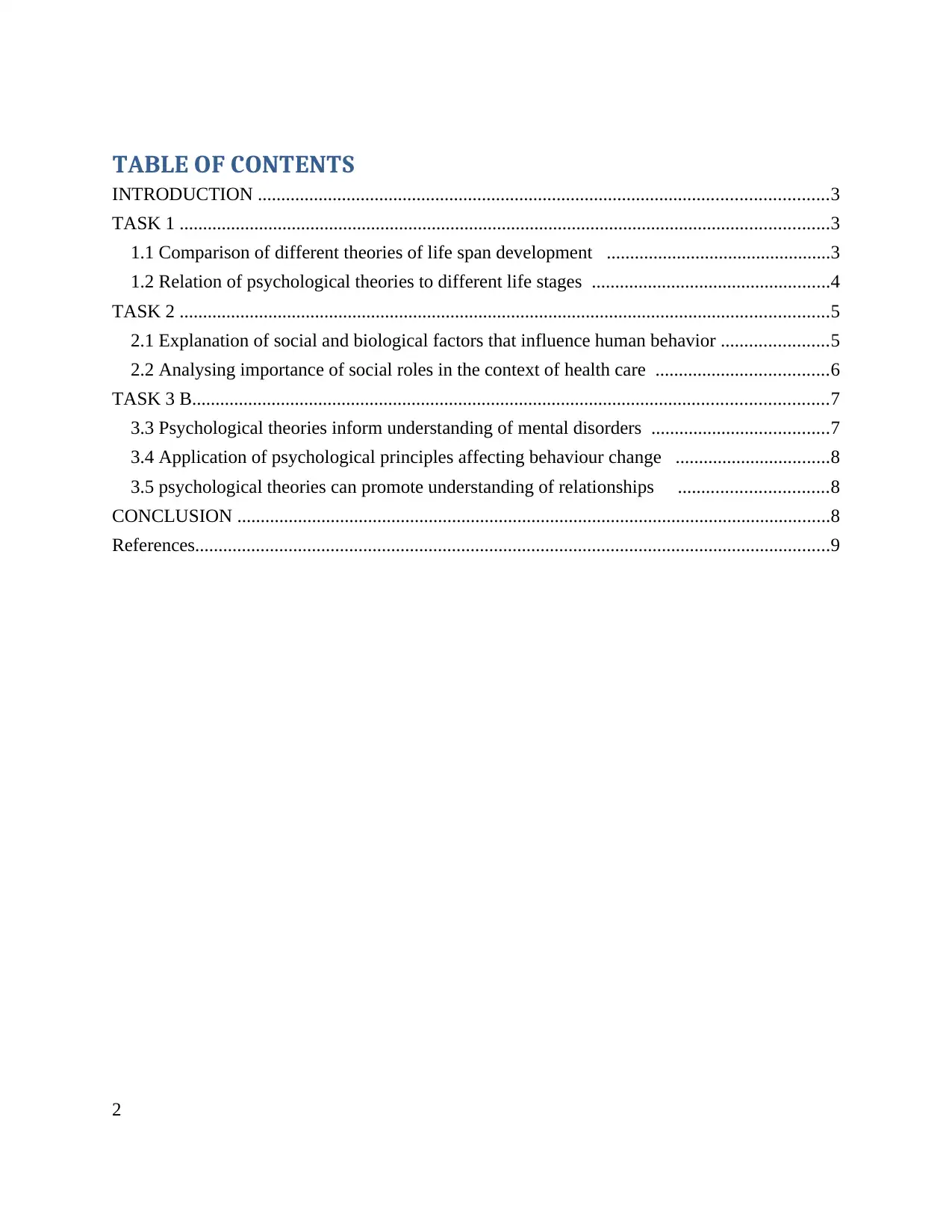
TABLE OF CONTENTS
INTRODUCTION ..........................................................................................................................3
TASK 1 ...........................................................................................................................................3
1.1 Comparison of different theories of life span development ................................................3
1.2 Relation of psychological theories to different life stages ...................................................4
TASK 2 ...........................................................................................................................................5
2.1 Explanation of social and biological factors that influence human behavior .......................5
2.2 Analysing importance of social roles in the context of health care .....................................6
TASK 3 B........................................................................................................................................7
3.3 Psychological theories inform understanding of mental disorders ......................................7
3.4 Application of psychological principles affecting behaviour change .................................8
3.5 psychological theories can promote understanding of relationships ................................8
CONCLUSION ...............................................................................................................................8
References........................................................................................................................................9
2
INTRODUCTION ..........................................................................................................................3
TASK 1 ...........................................................................................................................................3
1.1 Comparison of different theories of life span development ................................................3
1.2 Relation of psychological theories to different life stages ...................................................4
TASK 2 ...........................................................................................................................................5
2.1 Explanation of social and biological factors that influence human behavior .......................5
2.2 Analysing importance of social roles in the context of health care .....................................6
TASK 3 B........................................................................................................................................7
3.3 Psychological theories inform understanding of mental disorders ......................................7
3.4 Application of psychological principles affecting behaviour change .................................8
3.5 psychological theories can promote understanding of relationships ................................8
CONCLUSION ...............................................................................................................................8
References........................................................................................................................................9
2
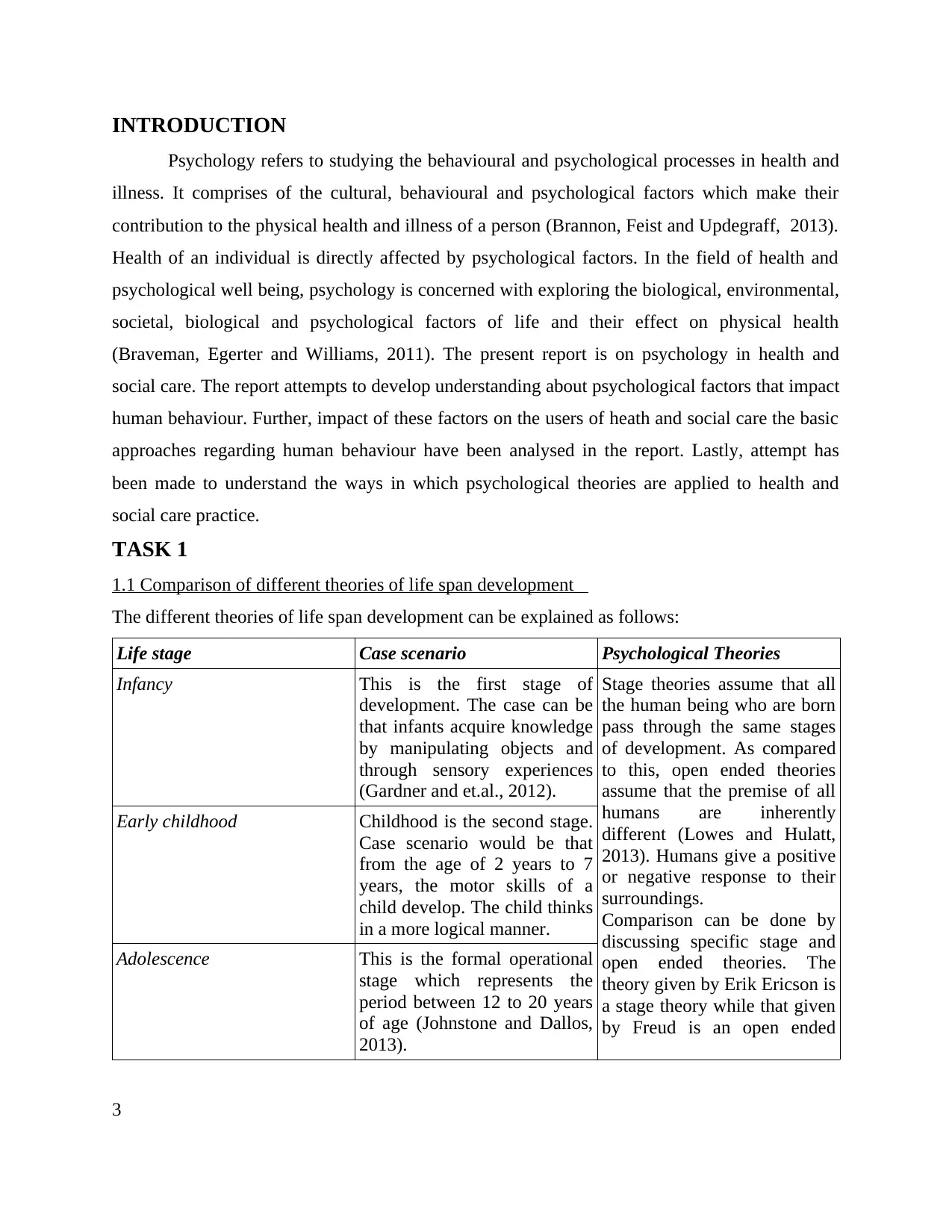
INTRODUCTION
Psychology refers to studying the behavioural and psychological processes in health and
illness. It comprises of the cultural, behavioural and psychological factors which make their
contribution to the physical health and illness of a person (Brannon, Feist and Updegraff, 2013).
Health of an individual is directly affected by psychological factors. In the field of health and
psychological well being, psychology is concerned with exploring the biological, environmental,
societal, biological and psychological factors of life and their effect on physical health
(Braveman, Egerter and Williams, 2011). The present report is on psychology in health and
social care. The report attempts to develop understanding about psychological factors that impact
human behaviour. Further, impact of these factors on the users of heath and social care the basic
approaches regarding human behaviour have been analysed in the report. Lastly, attempt has
been made to understand the ways in which psychological theories are applied to health and
social care practice.
TASK 1
1.1 Comparison of different theories of life span development
The different theories of life span development can be explained as follows:
Life stage Case scenario Psychological Theories
Infancy This is the first stage of
development. The case can be
that infants acquire knowledge
by manipulating objects and
through sensory experiences
(Gardner and et.al., 2012).
Stage theories assume that all
the human being who are born
pass through the same stages
of development. As compared
to this, open ended theories
assume that the premise of all
humans are inherently
different (Lowes and Hulatt,
2013). Humans give a positive
or negative response to their
surroundings.
Comparison can be done by
discussing specific stage and
open ended theories. The
theory given by Erik Ericson is
a stage theory while that given
by Freud is an open ended
Early childhood Childhood is the second stage.
Case scenario would be that
from the age of 2 years to 7
years, the motor skills of a
child develop. The child thinks
in a more logical manner.
Adolescence This is the formal operational
stage which represents the
period between 12 to 20 years
of age (Johnstone and Dallos,
2013).
3
Psychology refers to studying the behavioural and psychological processes in health and
illness. It comprises of the cultural, behavioural and psychological factors which make their
contribution to the physical health and illness of a person (Brannon, Feist and Updegraff, 2013).
Health of an individual is directly affected by psychological factors. In the field of health and
psychological well being, psychology is concerned with exploring the biological, environmental,
societal, biological and psychological factors of life and their effect on physical health
(Braveman, Egerter and Williams, 2011). The present report is on psychology in health and
social care. The report attempts to develop understanding about psychological factors that impact
human behaviour. Further, impact of these factors on the users of heath and social care the basic
approaches regarding human behaviour have been analysed in the report. Lastly, attempt has
been made to understand the ways in which psychological theories are applied to health and
social care practice.
TASK 1
1.1 Comparison of different theories of life span development
The different theories of life span development can be explained as follows:
Life stage Case scenario Psychological Theories
Infancy This is the first stage of
development. The case can be
that infants acquire knowledge
by manipulating objects and
through sensory experiences
(Gardner and et.al., 2012).
Stage theories assume that all
the human being who are born
pass through the same stages
of development. As compared
to this, open ended theories
assume that the premise of all
humans are inherently
different (Lowes and Hulatt,
2013). Humans give a positive
or negative response to their
surroundings.
Comparison can be done by
discussing specific stage and
open ended theories. The
theory given by Erik Ericson is
a stage theory while that given
by Freud is an open ended
Early childhood Childhood is the second stage.
Case scenario would be that
from the age of 2 years to 7
years, the motor skills of a
child develop. The child thinks
in a more logical manner.
Adolescence This is the formal operational
stage which represents the
period between 12 to 20 years
of age (Johnstone and Dallos,
2013).
3
⊘ This is a preview!⊘
Do you want full access?
Subscribe today to unlock all pages.

Trusted by 1+ million students worldwide
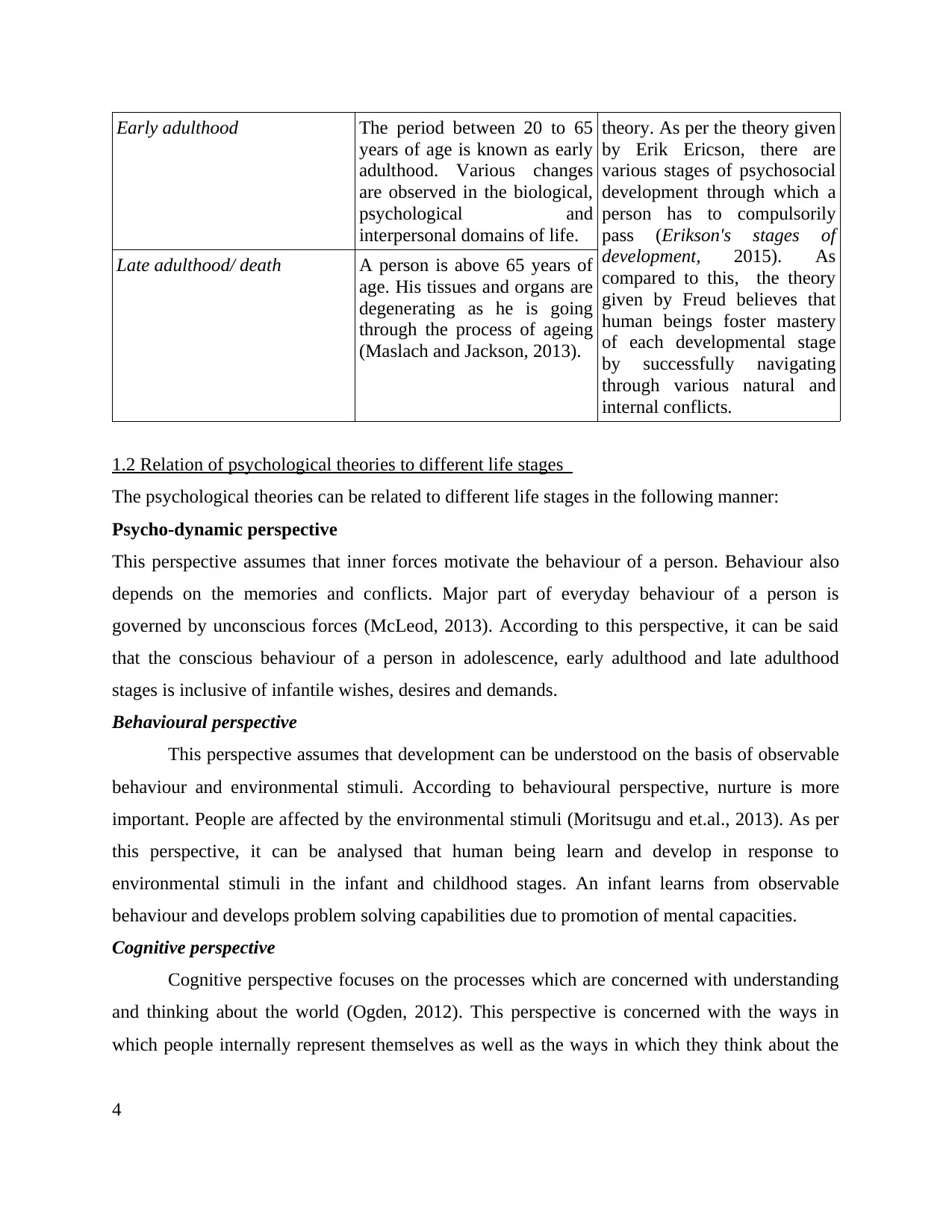
theory. As per the theory given
by Erik Ericson, there are
various stages of psychosocial
development through which a
person has to compulsorily
pass (Erikson's stages of
development, 2015). As
compared to this, the theory
given by Freud believes that
human beings foster mastery
of each developmental stage
by successfully navigating
through various natural and
internal conflicts.
Early adulthood The period between 20 to 65
years of age is known as early
adulthood. Various changes
are observed in the biological,
psychological and
interpersonal domains of life.
Late adulthood/ death A person is above 65 years of
age. His tissues and organs are
degenerating as he is going
through the process of ageing
(Maslach and Jackson, 2013).
1.2 Relation of psychological theories to different life stages
The psychological theories can be related to different life stages in the following manner:
Psycho-dynamic perspective
This perspective assumes that inner forces motivate the behaviour of a person. Behaviour also
depends on the memories and conflicts. Major part of everyday behaviour of a person is
governed by unconscious forces (McLeod, 2013). According to this perspective, it can be said
that the conscious behaviour of a person in adolescence, early adulthood and late adulthood
stages is inclusive of infantile wishes, desires and demands.
Behavioural perspective
This perspective assumes that development can be understood on the basis of observable
behaviour and environmental stimuli. According to behavioural perspective, nurture is more
important. People are affected by the environmental stimuli (Moritsugu and et.al., 2013). As per
this perspective, it can be analysed that human being learn and develop in response to
environmental stimuli in the infant and childhood stages. An infant learns from observable
behaviour and develops problem solving capabilities due to promotion of mental capacities.
Cognitive perspective
Cognitive perspective focuses on the processes which are concerned with understanding
and thinking about the world (Ogden, 2012). This perspective is concerned with the ways in
which people internally represent themselves as well as the ways in which they think about the
4
by Erik Ericson, there are
various stages of psychosocial
development through which a
person has to compulsorily
pass (Erikson's stages of
development, 2015). As
compared to this, the theory
given by Freud believes that
human beings foster mastery
of each developmental stage
by successfully navigating
through various natural and
internal conflicts.
Early adulthood The period between 20 to 65
years of age is known as early
adulthood. Various changes
are observed in the biological,
psychological and
interpersonal domains of life.
Late adulthood/ death A person is above 65 years of
age. His tissues and organs are
degenerating as he is going
through the process of ageing
(Maslach and Jackson, 2013).
1.2 Relation of psychological theories to different life stages
The psychological theories can be related to different life stages in the following manner:
Psycho-dynamic perspective
This perspective assumes that inner forces motivate the behaviour of a person. Behaviour also
depends on the memories and conflicts. Major part of everyday behaviour of a person is
governed by unconscious forces (McLeod, 2013). According to this perspective, it can be said
that the conscious behaviour of a person in adolescence, early adulthood and late adulthood
stages is inclusive of infantile wishes, desires and demands.
Behavioural perspective
This perspective assumes that development can be understood on the basis of observable
behaviour and environmental stimuli. According to behavioural perspective, nurture is more
important. People are affected by the environmental stimuli (Moritsugu and et.al., 2013). As per
this perspective, it can be analysed that human being learn and develop in response to
environmental stimuli in the infant and childhood stages. An infant learns from observable
behaviour and develops problem solving capabilities due to promotion of mental capacities.
Cognitive perspective
Cognitive perspective focuses on the processes which are concerned with understanding
and thinking about the world (Ogden, 2012). This perspective is concerned with the ways in
which people internally represent themselves as well as the ways in which they think about the
4
Paraphrase This Document
Need a fresh take? Get an instant paraphrase of this document with our AI Paraphraser
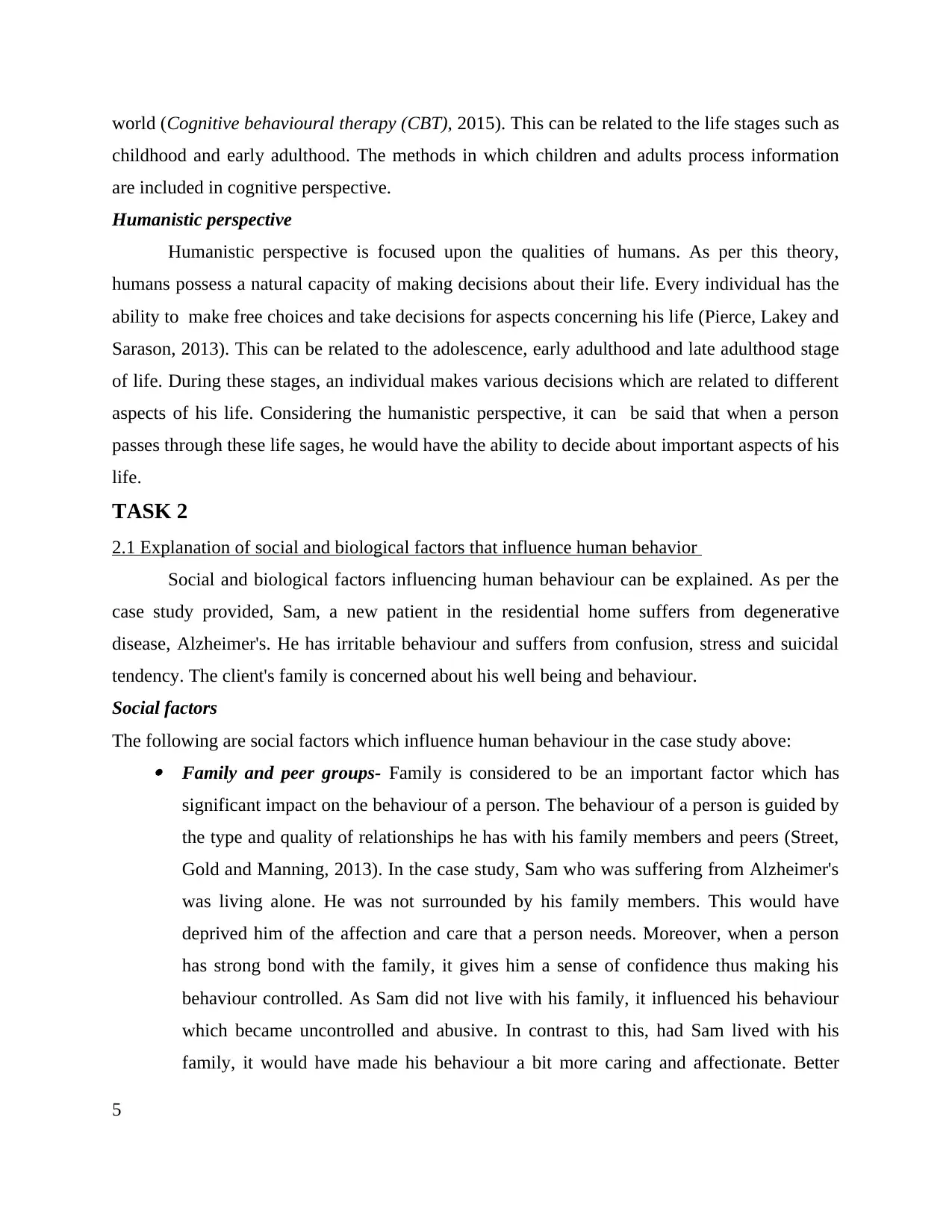
world (Cognitive behavioural therapy (CBT), 2015). This can be related to the life stages such as
childhood and early adulthood. The methods in which children and adults process information
are included in cognitive perspective.
Humanistic perspective
Humanistic perspective is focused upon the qualities of humans. As per this theory,
humans possess a natural capacity of making decisions about their life. Every individual has the
ability to make free choices and take decisions for aspects concerning his life (Pierce, Lakey and
Sarason, 2013). This can be related to the adolescence, early adulthood and late adulthood stage
of life. During these stages, an individual makes various decisions which are related to different
aspects of his life. Considering the humanistic perspective, it can be said that when a person
passes through these life sages, he would have the ability to decide about important aspects of his
life.
TASK 2
2.1 Explanation of social and biological factors that influence human behavior
Social and biological factors influencing human behaviour can be explained. As per the
case study provided, Sam, a new patient in the residential home suffers from degenerative
disease, Alzheimer's. He has irritable behaviour and suffers from confusion, stress and suicidal
tendency. The client's family is concerned about his well being and behaviour.
Social factors
The following are social factors which influence human behaviour in the case study above: Family and peer groups- Family is considered to be an important factor which has
significant impact on the behaviour of a person. The behaviour of a person is guided by
the type and quality of relationships he has with his family members and peers (Street,
Gold and Manning, 2013). In the case study, Sam who was suffering from Alzheimer's
was living alone. He was not surrounded by his family members. This would have
deprived him of the affection and care that a person needs. Moreover, when a person
has strong bond with the family, it gives him a sense of confidence thus making his
behaviour controlled. As Sam did not live with his family, it influenced his behaviour
which became uncontrolled and abusive. In contrast to this, had Sam lived with his
family, it would have made his behaviour a bit more caring and affectionate. Better
5
childhood and early adulthood. The methods in which children and adults process information
are included in cognitive perspective.
Humanistic perspective
Humanistic perspective is focused upon the qualities of humans. As per this theory,
humans possess a natural capacity of making decisions about their life. Every individual has the
ability to make free choices and take decisions for aspects concerning his life (Pierce, Lakey and
Sarason, 2013). This can be related to the adolescence, early adulthood and late adulthood stage
of life. During these stages, an individual makes various decisions which are related to different
aspects of his life. Considering the humanistic perspective, it can be said that when a person
passes through these life sages, he would have the ability to decide about important aspects of his
life.
TASK 2
2.1 Explanation of social and biological factors that influence human behavior
Social and biological factors influencing human behaviour can be explained. As per the
case study provided, Sam, a new patient in the residential home suffers from degenerative
disease, Alzheimer's. He has irritable behaviour and suffers from confusion, stress and suicidal
tendency. The client's family is concerned about his well being and behaviour.
Social factors
The following are social factors which influence human behaviour in the case study above: Family and peer groups- Family is considered to be an important factor which has
significant impact on the behaviour of a person. The behaviour of a person is guided by
the type and quality of relationships he has with his family members and peers (Street,
Gold and Manning, 2013). In the case study, Sam who was suffering from Alzheimer's
was living alone. He was not surrounded by his family members. This would have
deprived him of the affection and care that a person needs. Moreover, when a person
has strong bond with the family, it gives him a sense of confidence thus making his
behaviour controlled. As Sam did not live with his family, it influenced his behaviour
which became uncontrolled and abusive. In contrast to this, had Sam lived with his
family, it would have made his behaviour a bit more caring and affectionate. Better
5
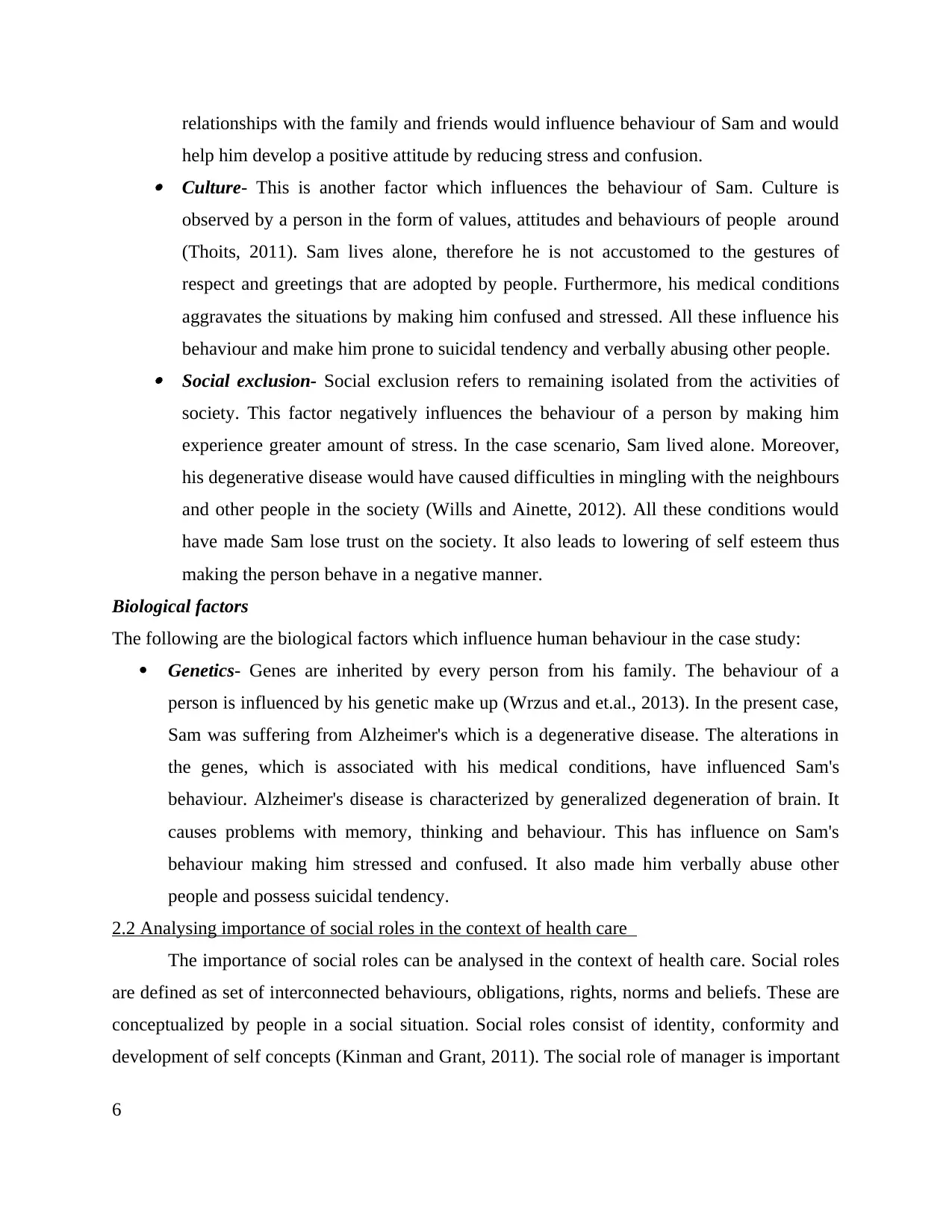
relationships with the family and friends would influence behaviour of Sam and would
help him develop a positive attitude by reducing stress and confusion. Culture- This is another factor which influences the behaviour of Sam. Culture is
observed by a person in the form of values, attitudes and behaviours of people around
(Thoits, 2011). Sam lives alone, therefore he is not accustomed to the gestures of
respect and greetings that are adopted by people. Furthermore, his medical conditions
aggravates the situations by making him confused and stressed. All these influence his
behaviour and make him prone to suicidal tendency and verbally abusing other people. Social exclusion- Social exclusion refers to remaining isolated from the activities of
society. This factor negatively influences the behaviour of a person by making him
experience greater amount of stress. In the case scenario, Sam lived alone. Moreover,
his degenerative disease would have caused difficulties in mingling with the neighbours
and other people in the society (Wills and Ainette, 2012). All these conditions would
have made Sam lose trust on the society. It also leads to lowering of self esteem thus
making the person behave in a negative manner.
Biological factors
The following are the biological factors which influence human behaviour in the case study:
Genetics- Genes are inherited by every person from his family. The behaviour of a
person is influenced by his genetic make up (Wrzus and et.al., 2013). In the present case,
Sam was suffering from Alzheimer's which is a degenerative disease. The alterations in
the genes, which is associated with his medical conditions, have influenced Sam's
behaviour. Alzheimer's disease is characterized by generalized degeneration of brain. It
causes problems with memory, thinking and behaviour. This has influence on Sam's
behaviour making him stressed and confused. It also made him verbally abuse other
people and possess suicidal tendency.
2.2 Analysing importance of social roles in the context of health care
The importance of social roles can be analysed in the context of health care. Social roles
are defined as set of interconnected behaviours, obligations, rights, norms and beliefs. These are
conceptualized by people in a social situation. Social roles consist of identity, conformity and
development of self concepts (Kinman and Grant, 2011). The social role of manager is important
6
help him develop a positive attitude by reducing stress and confusion. Culture- This is another factor which influences the behaviour of Sam. Culture is
observed by a person in the form of values, attitudes and behaviours of people around
(Thoits, 2011). Sam lives alone, therefore he is not accustomed to the gestures of
respect and greetings that are adopted by people. Furthermore, his medical conditions
aggravates the situations by making him confused and stressed. All these influence his
behaviour and make him prone to suicidal tendency and verbally abusing other people. Social exclusion- Social exclusion refers to remaining isolated from the activities of
society. This factor negatively influences the behaviour of a person by making him
experience greater amount of stress. In the case scenario, Sam lived alone. Moreover,
his degenerative disease would have caused difficulties in mingling with the neighbours
and other people in the society (Wills and Ainette, 2012). All these conditions would
have made Sam lose trust on the society. It also leads to lowering of self esteem thus
making the person behave in a negative manner.
Biological factors
The following are the biological factors which influence human behaviour in the case study:
Genetics- Genes are inherited by every person from his family. The behaviour of a
person is influenced by his genetic make up (Wrzus and et.al., 2013). In the present case,
Sam was suffering from Alzheimer's which is a degenerative disease. The alterations in
the genes, which is associated with his medical conditions, have influenced Sam's
behaviour. Alzheimer's disease is characterized by generalized degeneration of brain. It
causes problems with memory, thinking and behaviour. This has influence on Sam's
behaviour making him stressed and confused. It also made him verbally abuse other
people and possess suicidal tendency.
2.2 Analysing importance of social roles in the context of health care
The importance of social roles can be analysed in the context of health care. Social roles
are defined as set of interconnected behaviours, obligations, rights, norms and beliefs. These are
conceptualized by people in a social situation. Social roles consist of identity, conformity and
development of self concepts (Kinman and Grant, 2011). The social role of manager is important
6
⊘ This is a preview!⊘
Do you want full access?
Subscribe today to unlock all pages.

Trusted by 1+ million students worldwide
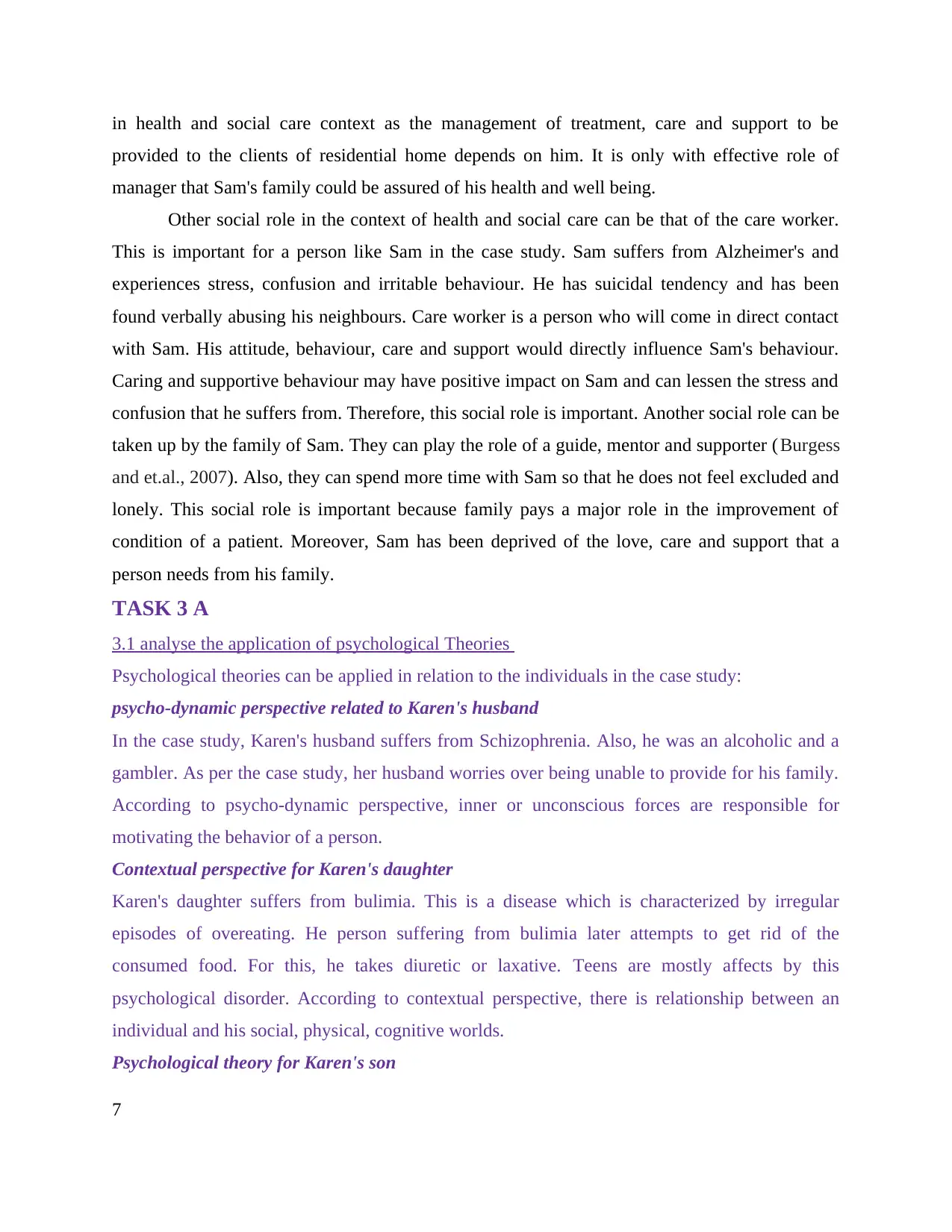
in health and social care context as the management of treatment, care and support to be
provided to the clients of residential home depends on him. It is only with effective role of
manager that Sam's family could be assured of his health and well being.
Other social role in the context of health and social care can be that of the care worker.
This is important for a person like Sam in the case study. Sam suffers from Alzheimer's and
experiences stress, confusion and irritable behaviour. He has suicidal tendency and has been
found verbally abusing his neighbours. Care worker is a person who will come in direct contact
with Sam. His attitude, behaviour, care and support would directly influence Sam's behaviour.
Caring and supportive behaviour may have positive impact on Sam and can lessen the stress and
confusion that he suffers from. Therefore, this social role is important. Another social role can be
taken up by the family of Sam. They can play the role of a guide, mentor and supporter ( Burgess
and et.al., 2007). Also, they can spend more time with Sam so that he does not feel excluded and
lonely. This social role is important because family pays a major role in the improvement of
condition of a patient. Moreover, Sam has been deprived of the love, care and support that a
person needs from his family.
TASK 3 A
3.1 analyse the application of psychological Theories
Psychological theories can be applied in relation to the individuals in the case study:
psycho-dynamic perspective related to Karen's husband
In the case study, Karen's husband suffers from Schizophrenia. Also, he was an alcoholic and a
gambler. As per the case study, her husband worries over being unable to provide for his family.
According to psycho-dynamic perspective, inner or unconscious forces are responsible for
motivating the behavior of a person.
Contextual perspective for Karen's daughter
Karen's daughter suffers from bulimia. This is a disease which is characterized by irregular
episodes of overeating. He person suffering from bulimia later attempts to get rid of the
consumed food. For this, he takes diuretic or laxative. Teens are mostly affects by this
psychological disorder. According to contextual perspective, there is relationship between an
individual and his social, physical, cognitive worlds.
Psychological theory for Karen's son
7
provided to the clients of residential home depends on him. It is only with effective role of
manager that Sam's family could be assured of his health and well being.
Other social role in the context of health and social care can be that of the care worker.
This is important for a person like Sam in the case study. Sam suffers from Alzheimer's and
experiences stress, confusion and irritable behaviour. He has suicidal tendency and has been
found verbally abusing his neighbours. Care worker is a person who will come in direct contact
with Sam. His attitude, behaviour, care and support would directly influence Sam's behaviour.
Caring and supportive behaviour may have positive impact on Sam and can lessen the stress and
confusion that he suffers from. Therefore, this social role is important. Another social role can be
taken up by the family of Sam. They can play the role of a guide, mentor and supporter ( Burgess
and et.al., 2007). Also, they can spend more time with Sam so that he does not feel excluded and
lonely. This social role is important because family pays a major role in the improvement of
condition of a patient. Moreover, Sam has been deprived of the love, care and support that a
person needs from his family.
TASK 3 A
3.1 analyse the application of psychological Theories
Psychological theories can be applied in relation to the individuals in the case study:
psycho-dynamic perspective related to Karen's husband
In the case study, Karen's husband suffers from Schizophrenia. Also, he was an alcoholic and a
gambler. As per the case study, her husband worries over being unable to provide for his family.
According to psycho-dynamic perspective, inner or unconscious forces are responsible for
motivating the behavior of a person.
Contextual perspective for Karen's daughter
Karen's daughter suffers from bulimia. This is a disease which is characterized by irregular
episodes of overeating. He person suffering from bulimia later attempts to get rid of the
consumed food. For this, he takes diuretic or laxative. Teens are mostly affects by this
psychological disorder. According to contextual perspective, there is relationship between an
individual and his social, physical, cognitive worlds.
Psychological theory for Karen's son
7
Paraphrase This Document
Need a fresh take? Get an instant paraphrase of this document with our AI Paraphraser
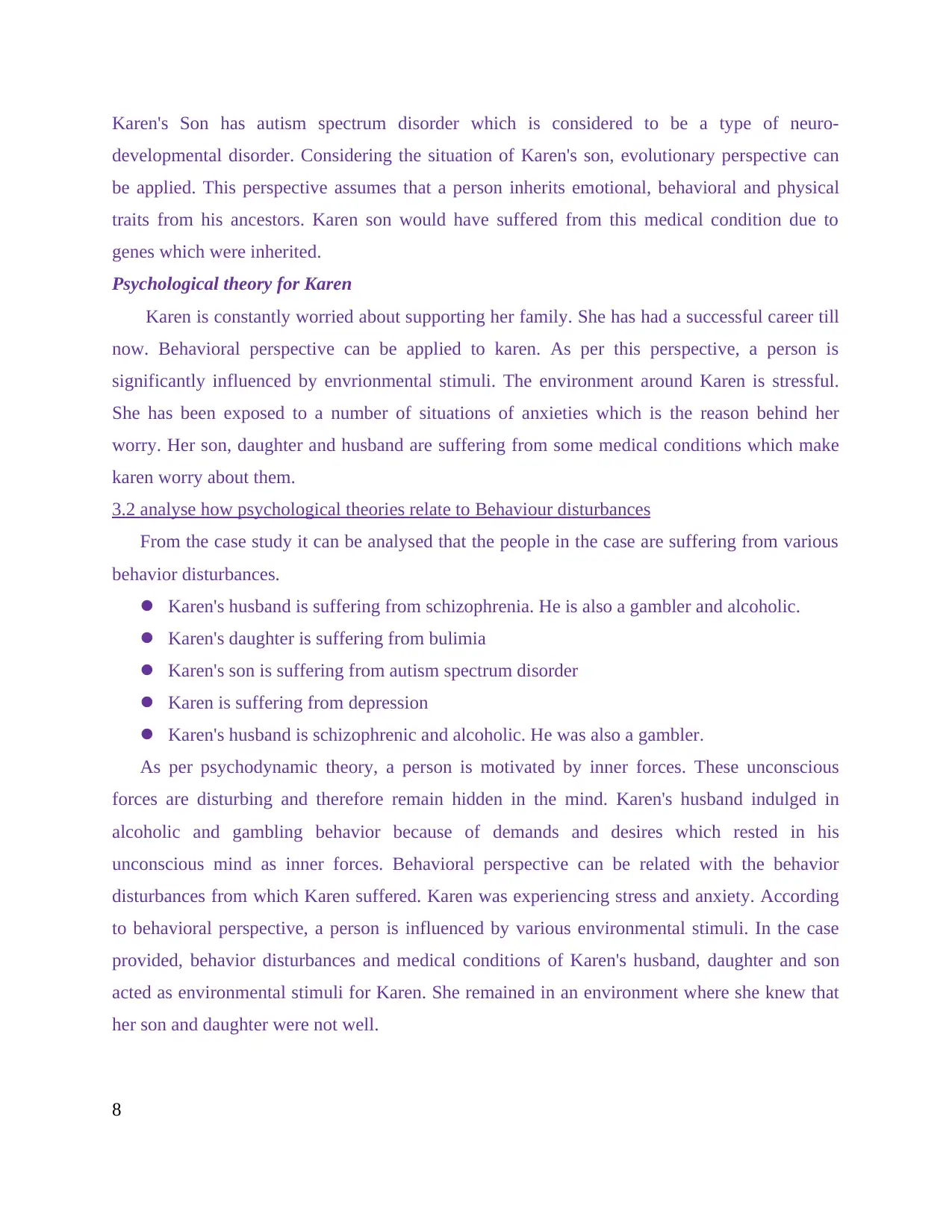
Karen's Son has autism spectrum disorder which is considered to be a type of neuro-
developmental disorder. Considering the situation of Karen's son, evolutionary perspective can
be applied. This perspective assumes that a person inherits emotional, behavioral and physical
traits from his ancestors. Karen son would have suffered from this medical condition due to
genes which were inherited.
Psychological theory for Karen
Karen is constantly worried about supporting her family. She has had a successful career till
now. Behavioral perspective can be applied to karen. As per this perspective, a person is
significantly influenced by envrionmental stimuli. The environment around Karen is stressful.
She has been exposed to a number of situations of anxieties which is the reason behind her
worry. Her son, daughter and husband are suffering from some medical conditions which make
karen worry about them.
3.2 analyse how psychological theories relate to Behaviour disturbances
From the case study it can be analysed that the people in the case are suffering from various
behavior disturbances.
Karen's husband is suffering from schizophrenia. He is also a gambler and alcoholic.
Karen's daughter is suffering from bulimia
Karen's son is suffering from autism spectrum disorder
Karen is suffering from depression
Karen's husband is schizophrenic and alcoholic. He was also a gambler.
As per psychodynamic theory, a person is motivated by inner forces. These unconscious
forces are disturbing and therefore remain hidden in the mind. Karen's husband indulged in
alcoholic and gambling behavior because of demands and desires which rested in his
unconscious mind as inner forces. Behavioral perspective can be related with the behavior
disturbances from which Karen suffered. Karen was experiencing stress and anxiety. According
to behavioral perspective, a person is influenced by various environmental stimuli. In the case
provided, behavior disturbances and medical conditions of Karen's husband, daughter and son
acted as environmental stimuli for Karen. She remained in an environment where she knew that
her son and daughter were not well.
8
developmental disorder. Considering the situation of Karen's son, evolutionary perspective can
be applied. This perspective assumes that a person inherits emotional, behavioral and physical
traits from his ancestors. Karen son would have suffered from this medical condition due to
genes which were inherited.
Psychological theory for Karen
Karen is constantly worried about supporting her family. She has had a successful career till
now. Behavioral perspective can be applied to karen. As per this perspective, a person is
significantly influenced by envrionmental stimuli. The environment around Karen is stressful.
She has been exposed to a number of situations of anxieties which is the reason behind her
worry. Her son, daughter and husband are suffering from some medical conditions which make
karen worry about them.
3.2 analyse how psychological theories relate to Behaviour disturbances
From the case study it can be analysed that the people in the case are suffering from various
behavior disturbances.
Karen's husband is suffering from schizophrenia. He is also a gambler and alcoholic.
Karen's daughter is suffering from bulimia
Karen's son is suffering from autism spectrum disorder
Karen is suffering from depression
Karen's husband is schizophrenic and alcoholic. He was also a gambler.
As per psychodynamic theory, a person is motivated by inner forces. These unconscious
forces are disturbing and therefore remain hidden in the mind. Karen's husband indulged in
alcoholic and gambling behavior because of demands and desires which rested in his
unconscious mind as inner forces. Behavioral perspective can be related with the behavior
disturbances from which Karen suffered. Karen was experiencing stress and anxiety. According
to behavioral perspective, a person is influenced by various environmental stimuli. In the case
provided, behavior disturbances and medical conditions of Karen's husband, daughter and son
acted as environmental stimuli for Karen. She remained in an environment where she knew that
her son and daughter were not well.
8
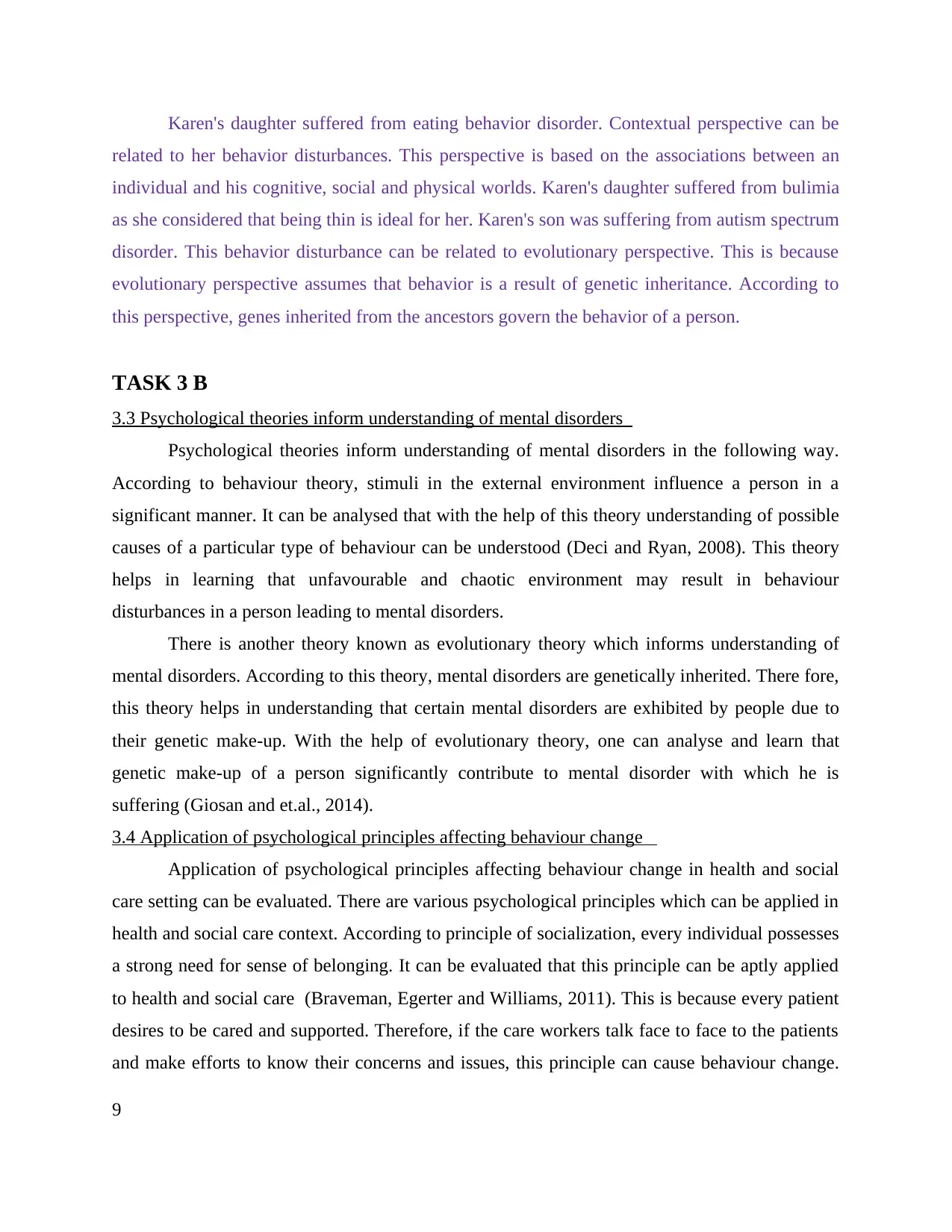
Karen's daughter suffered from eating behavior disorder. Contextual perspective can be
related to her behavior disturbances. This perspective is based on the associations between an
individual and his cognitive, social and physical worlds. Karen's daughter suffered from bulimia
as she considered that being thin is ideal for her. Karen's son was suffering from autism spectrum
disorder. This behavior disturbance can be related to evolutionary perspective. This is because
evolutionary perspective assumes that behavior is a result of genetic inheritance. According to
this perspective, genes inherited from the ancestors govern the behavior of a person.
TASK 3 B
3.3 Psychological theories inform understanding of mental disorders
Psychological theories inform understanding of mental disorders in the following way.
According to behaviour theory, stimuli in the external environment influence a person in a
significant manner. It can be analysed that with the help of this theory understanding of possible
causes of a particular type of behaviour can be understood (Deci and Ryan, 2008). This theory
helps in learning that unfavourable and chaotic environment may result in behaviour
disturbances in a person leading to mental disorders.
There is another theory known as evolutionary theory which informs understanding of
mental disorders. According to this theory, mental disorders are genetically inherited. There fore,
this theory helps in understanding that certain mental disorders are exhibited by people due to
their genetic make-up. With the help of evolutionary theory, one can analyse and learn that
genetic make-up of a person significantly contribute to mental disorder with which he is
suffering (Giosan and et.al., 2014).
3.4 Application of psychological principles affecting behaviour change
Application of psychological principles affecting behaviour change in health and social
care setting can be evaluated. There are various psychological principles which can be applied in
health and social care context. According to principle of socialization, every individual possesses
a strong need for sense of belonging. It can be evaluated that this principle can be aptly applied
to health and social care (Braveman, Egerter and Williams, 2011). This is because every patient
desires to be cared and supported. Therefore, if the care workers talk face to face to the patients
and make efforts to know their concerns and issues, this principle can cause behaviour change.
9
related to her behavior disturbances. This perspective is based on the associations between an
individual and his cognitive, social and physical worlds. Karen's daughter suffered from bulimia
as she considered that being thin is ideal for her. Karen's son was suffering from autism spectrum
disorder. This behavior disturbance can be related to evolutionary perspective. This is because
evolutionary perspective assumes that behavior is a result of genetic inheritance. According to
this perspective, genes inherited from the ancestors govern the behavior of a person.
TASK 3 B
3.3 Psychological theories inform understanding of mental disorders
Psychological theories inform understanding of mental disorders in the following way.
According to behaviour theory, stimuli in the external environment influence a person in a
significant manner. It can be analysed that with the help of this theory understanding of possible
causes of a particular type of behaviour can be understood (Deci and Ryan, 2008). This theory
helps in learning that unfavourable and chaotic environment may result in behaviour
disturbances in a person leading to mental disorders.
There is another theory known as evolutionary theory which informs understanding of
mental disorders. According to this theory, mental disorders are genetically inherited. There fore,
this theory helps in understanding that certain mental disorders are exhibited by people due to
their genetic make-up. With the help of evolutionary theory, one can analyse and learn that
genetic make-up of a person significantly contribute to mental disorder with which he is
suffering (Giosan and et.al., 2014).
3.4 Application of psychological principles affecting behaviour change
Application of psychological principles affecting behaviour change in health and social
care setting can be evaluated. There are various psychological principles which can be applied in
health and social care context. According to principle of socialization, every individual possesses
a strong need for sense of belonging. It can be evaluated that this principle can be aptly applied
to health and social care (Braveman, Egerter and Williams, 2011). This is because every patient
desires to be cared and supported. Therefore, if the care workers talk face to face to the patients
and make efforts to know their concerns and issues, this principle can cause behaviour change.
9
⊘ This is a preview!⊘
Do you want full access?
Subscribe today to unlock all pages.

Trusted by 1+ million students worldwide
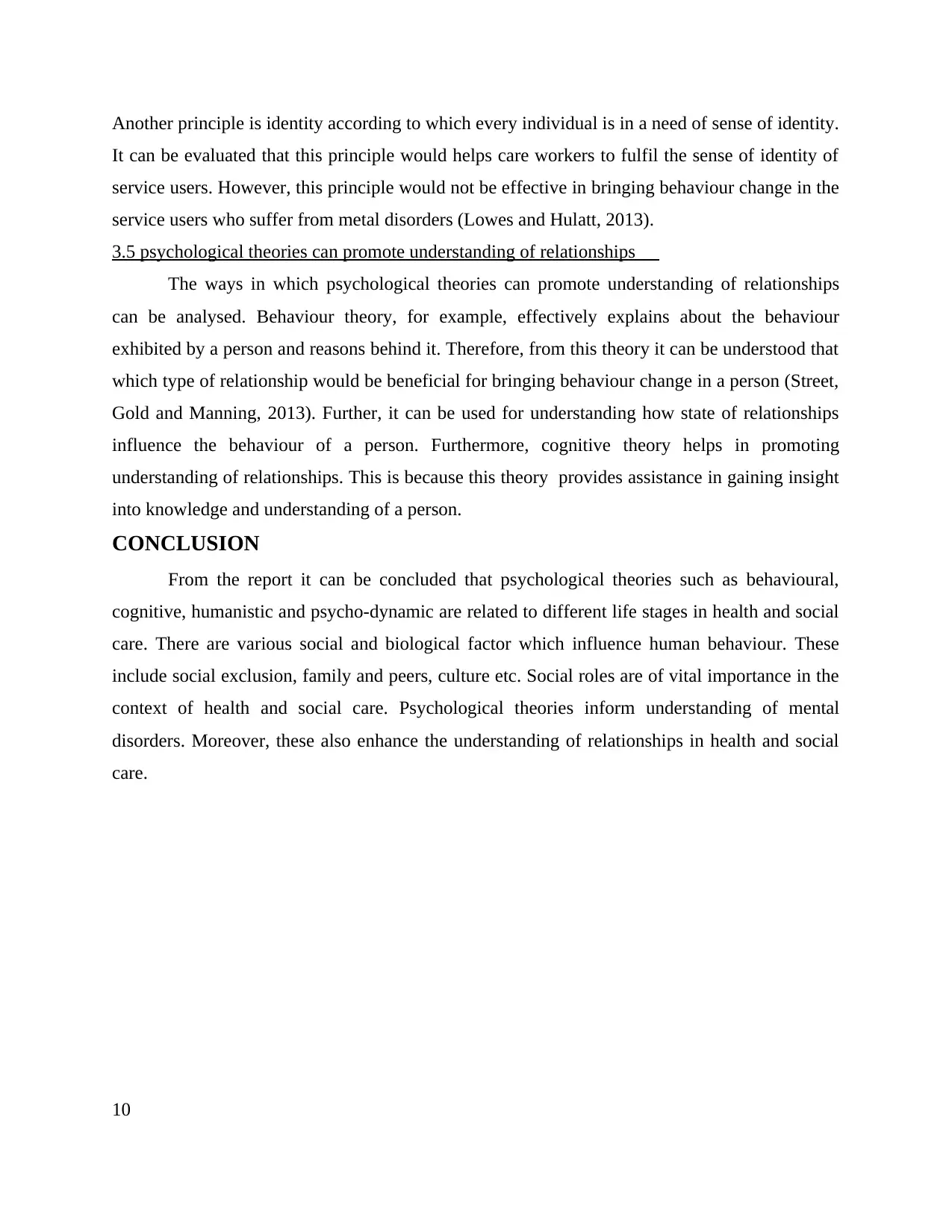
Another principle is identity according to which every individual is in a need of sense of identity.
It can be evaluated that this principle would helps care workers to fulfil the sense of identity of
service users. However, this principle would not be effective in bringing behaviour change in the
service users who suffer from metal disorders (Lowes and Hulatt, 2013).
3.5 psychological theories can promote understanding of relationships
The ways in which psychological theories can promote understanding of relationships
can be analysed. Behaviour theory, for example, effectively explains about the behaviour
exhibited by a person and reasons behind it. Therefore, from this theory it can be understood that
which type of relationship would be beneficial for bringing behaviour change in a person (Street,
Gold and Manning, 2013). Further, it can be used for understanding how state of relationships
influence the behaviour of a person. Furthermore, cognitive theory helps in promoting
understanding of relationships. This is because this theory provides assistance in gaining insight
into knowledge and understanding of a person.
CONCLUSION
From the report it can be concluded that psychological theories such as behavioural,
cognitive, humanistic and psycho-dynamic are related to different life stages in health and social
care. There are various social and biological factor which influence human behaviour. These
include social exclusion, family and peers, culture etc. Social roles are of vital importance in the
context of health and social care. Psychological theories inform understanding of mental
disorders. Moreover, these also enhance the understanding of relationships in health and social
care.
10
It can be evaluated that this principle would helps care workers to fulfil the sense of identity of
service users. However, this principle would not be effective in bringing behaviour change in the
service users who suffer from metal disorders (Lowes and Hulatt, 2013).
3.5 psychological theories can promote understanding of relationships
The ways in which psychological theories can promote understanding of relationships
can be analysed. Behaviour theory, for example, effectively explains about the behaviour
exhibited by a person and reasons behind it. Therefore, from this theory it can be understood that
which type of relationship would be beneficial for bringing behaviour change in a person (Street,
Gold and Manning, 2013). Further, it can be used for understanding how state of relationships
influence the behaviour of a person. Furthermore, cognitive theory helps in promoting
understanding of relationships. This is because this theory provides assistance in gaining insight
into knowledge and understanding of a person.
CONCLUSION
From the report it can be concluded that psychological theories such as behavioural,
cognitive, humanistic and psycho-dynamic are related to different life stages in health and social
care. There are various social and biological factor which influence human behaviour. These
include social exclusion, family and peers, culture etc. Social roles are of vital importance in the
context of health and social care. Psychological theories inform understanding of mental
disorders. Moreover, these also enhance the understanding of relationships in health and social
care.
10
Paraphrase This Document
Need a fresh take? Get an instant paraphrase of this document with our AI Paraphraser
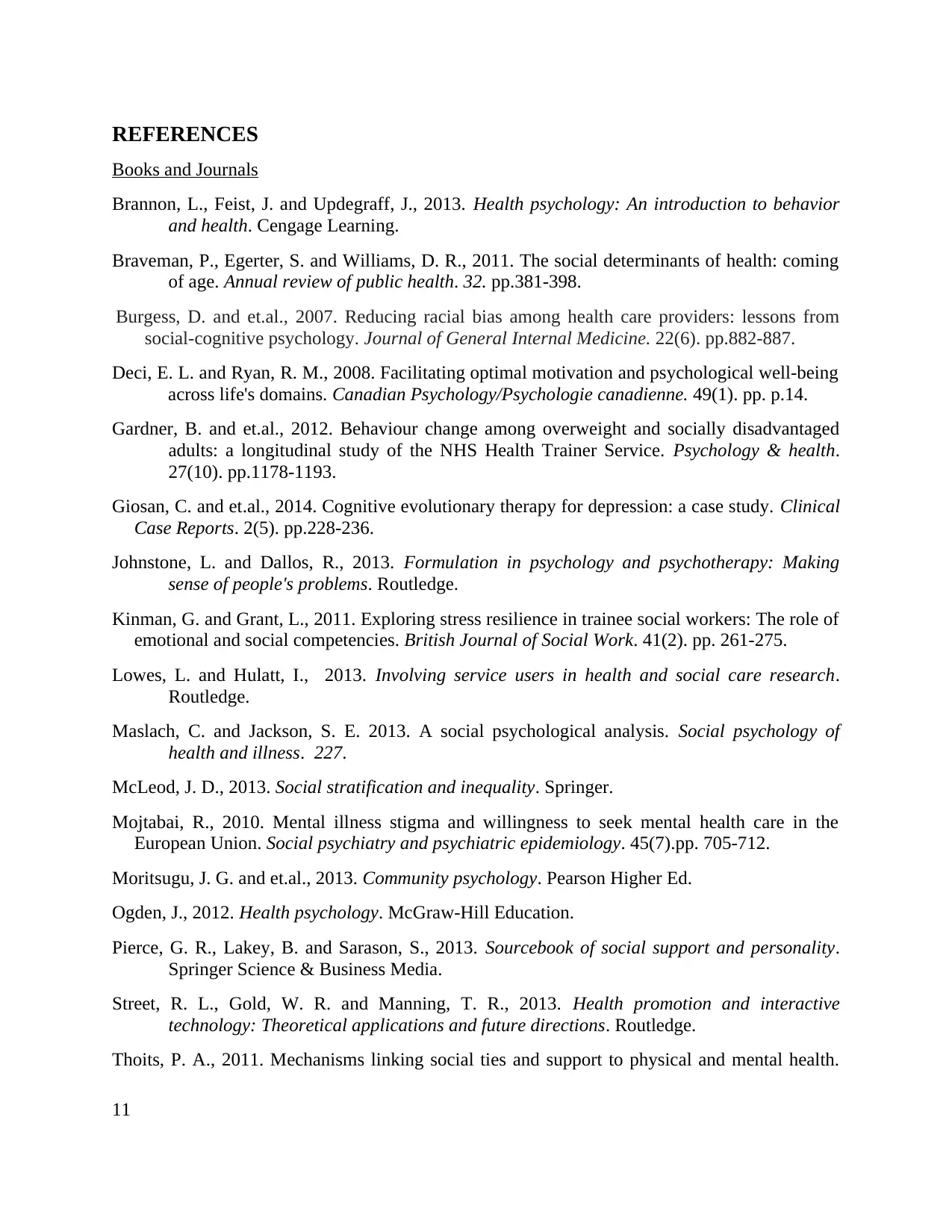
REFERENCES
Books and Journals
Brannon, L., Feist, J. and Updegraff, J., 2013. Health psychology: An introduction to behavior
and health. Cengage Learning.
Braveman, P., Egerter, S. and Williams, D. R., 2011. The social determinants of health: coming
of age. Annual review of public health. 32. pp.381-398.
Burgess, D. and et.al., 2007. Reducing racial bias among health care providers: lessons from
social-cognitive psychology. Journal of General Internal Medicine. 22(6). pp.882-887.
Deci, E. L. and Ryan, R. M., 2008. Facilitating optimal motivation and psychological well-being
across life's domains. Canadian Psychology/Psychologie canadienne. 49(1). pp. p.14.
Gardner, B. and et.al., 2012. Behaviour change among overweight and socially disadvantaged
adults: a longitudinal study of the NHS Health Trainer Service. Psychology & health.
27(10). pp.1178-1193.
Giosan, C. and et.al., 2014. Cognitive evolutionary therapy for depression: a case study. Clinical
Case Reports. 2(5). pp.228-236.
Johnstone, L. and Dallos, R., 2013. Formulation in psychology and psychotherapy: Making
sense of people's problems. Routledge.
Kinman, G. and Grant, L., 2011. Exploring stress resilience in trainee social workers: The role of
emotional and social competencies. British Journal of Social Work. 41(2). pp. 261-275.
Lowes, L. and Hulatt, I., 2013. Involving service users in health and social care research.
Routledge.
Maslach, C. and Jackson, S. E. 2013. A social psychological analysis. Social psychology of
health and illness. 227.
McLeod, J. D., 2013. Social stratification and inequality. Springer.
Mojtabai, R., 2010. Mental illness stigma and willingness to seek mental health care in the
European Union. Social psychiatry and psychiatric epidemiology. 45(7).pp. 705-712.
Moritsugu, J. G. and et.al., 2013. Community psychology. Pearson Higher Ed.
Ogden, J., 2012. Health psychology. McGraw-Hill Education.
Pierce, G. R., Lakey, B. and Sarason, S., 2013. Sourcebook of social support and personality.
Springer Science & Business Media.
Street, R. L., Gold, W. R. and Manning, T. R., 2013. Health promotion and interactive
technology: Theoretical applications and future directions. Routledge.
Thoits, P. A., 2011. Mechanisms linking social ties and support to physical and mental health.
11
Books and Journals
Brannon, L., Feist, J. and Updegraff, J., 2013. Health psychology: An introduction to behavior
and health. Cengage Learning.
Braveman, P., Egerter, S. and Williams, D. R., 2011. The social determinants of health: coming
of age. Annual review of public health. 32. pp.381-398.
Burgess, D. and et.al., 2007. Reducing racial bias among health care providers: lessons from
social-cognitive psychology. Journal of General Internal Medicine. 22(6). pp.882-887.
Deci, E. L. and Ryan, R. M., 2008. Facilitating optimal motivation and psychological well-being
across life's domains. Canadian Psychology/Psychologie canadienne. 49(1). pp. p.14.
Gardner, B. and et.al., 2012. Behaviour change among overweight and socially disadvantaged
adults: a longitudinal study of the NHS Health Trainer Service. Psychology & health.
27(10). pp.1178-1193.
Giosan, C. and et.al., 2014. Cognitive evolutionary therapy for depression: a case study. Clinical
Case Reports. 2(5). pp.228-236.
Johnstone, L. and Dallos, R., 2013. Formulation in psychology and psychotherapy: Making
sense of people's problems. Routledge.
Kinman, G. and Grant, L., 2011. Exploring stress resilience in trainee social workers: The role of
emotional and social competencies. British Journal of Social Work. 41(2). pp. 261-275.
Lowes, L. and Hulatt, I., 2013. Involving service users in health and social care research.
Routledge.
Maslach, C. and Jackson, S. E. 2013. A social psychological analysis. Social psychology of
health and illness. 227.
McLeod, J. D., 2013. Social stratification and inequality. Springer.
Mojtabai, R., 2010. Mental illness stigma and willingness to seek mental health care in the
European Union. Social psychiatry and psychiatric epidemiology. 45(7).pp. 705-712.
Moritsugu, J. G. and et.al., 2013. Community psychology. Pearson Higher Ed.
Ogden, J., 2012. Health psychology. McGraw-Hill Education.
Pierce, G. R., Lakey, B. and Sarason, S., 2013. Sourcebook of social support and personality.
Springer Science & Business Media.
Street, R. L., Gold, W. R. and Manning, T. R., 2013. Health promotion and interactive
technology: Theoretical applications and future directions. Routledge.
Thoits, P. A., 2011. Mechanisms linking social ties and support to physical and mental health.
11
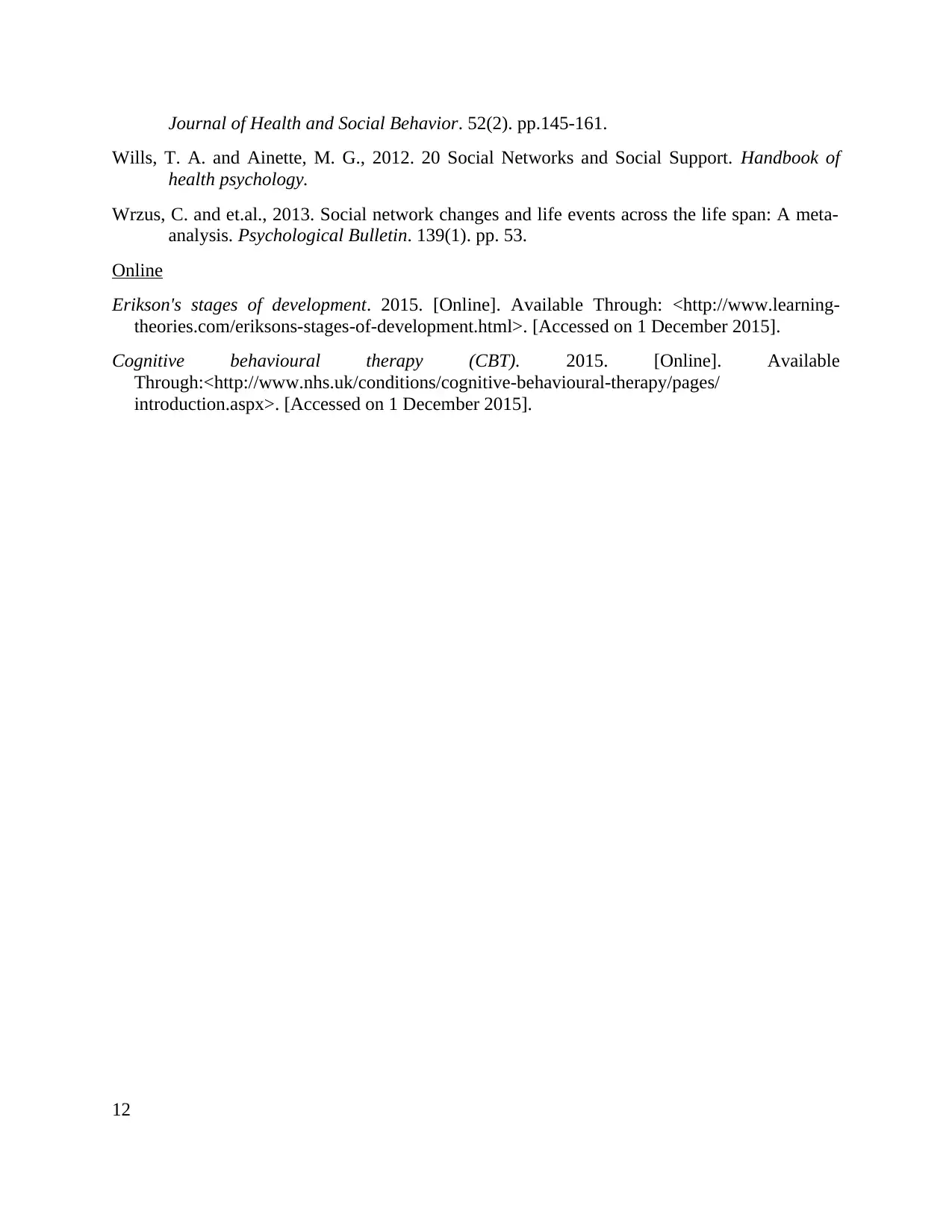
Journal of Health and Social Behavior. 52(2). pp.145-161.
Wills, T. A. and Ainette, M. G., 2012. 20 Social Networks and Social Support. Handbook of
health psychology.
Wrzus, C. and et.al., 2013. Social network changes and life events across the life span: A meta-
analysis. Psychological Bulletin. 139(1). pp. 53.
Online
Erikson's stages of development. 2015. [Online]. Available Through: <http://www.learning-
theories.com/eriksons-stages-of-development.html>. [Accessed on 1 December 2015].
Cognitive behavioural therapy (CBT). 2015. [Online]. Available
Through:<http://www.nhs.uk/conditions/cognitive-behavioural-therapy/pages/
introduction.aspx>. [Accessed on 1 December 2015].
12
Wills, T. A. and Ainette, M. G., 2012. 20 Social Networks and Social Support. Handbook of
health psychology.
Wrzus, C. and et.al., 2013. Social network changes and life events across the life span: A meta-
analysis. Psychological Bulletin. 139(1). pp. 53.
Online
Erikson's stages of development. 2015. [Online]. Available Through: <http://www.learning-
theories.com/eriksons-stages-of-development.html>. [Accessed on 1 December 2015].
Cognitive behavioural therapy (CBT). 2015. [Online]. Available
Through:<http://www.nhs.uk/conditions/cognitive-behavioural-therapy/pages/
introduction.aspx>. [Accessed on 1 December 2015].
12
⊘ This is a preview!⊘
Do you want full access?
Subscribe today to unlock all pages.

Trusted by 1+ million students worldwide
1 out of 12
Related Documents
Your All-in-One AI-Powered Toolkit for Academic Success.
+13062052269
info@desklib.com
Available 24*7 on WhatsApp / Email
![[object Object]](/_next/static/media/star-bottom.7253800d.svg)
Unlock your academic potential
Copyright © 2020–2026 A2Z Services. All Rights Reserved. Developed and managed by ZUCOL.





